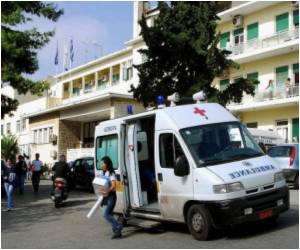
On Samos, paramedic Georgia Tolli has first-hand experience of the damage that the spending cuts have inflicted on the island's healthcare system.
"Our greatest fear at the moment is having two very serious incidents occurring simultaneously and being called upon to chose which one of the two we must go to -- in other words to chose who lives and who dies," she told AFP.
Cuts to Samos' health budget have reduced the emergency response to a single team of paramedics and a single ambulance, to cover the island's population of 30,000.
Tolli's worst fears came true in the final months of 2014.
When a 34-year-old man was involved in a motorbike accident in November, the ambulance was already involved in another emergency. The motorcyclist died.
Advertisement
When the ambulance finally made it along the island's winding and mountainous roads to the home of the elderly man who had suffered a heart attack, it was too late. He too was dead.
Advertisement
"When I first came to Samos, there were enough paramedics to have at least two ambulances operating around the clock," Tolli said.
In 2010, nine paramedics were backed up by five ambulance drivers. When the drivers retired or left, they were never replaced.
In 2009, as Greece began to slip towards its economic near-collapse, it was forced to begin making drastic public spending cuts. International creditors, the IMF and the EU, made a reorganisation of the Greek health service one of the priorities in return for their assistance.
The aim was to reduce the overspending and corruption that plagued Greece's public health system.
"But it was done without really looking in detail at what was being done," an EU source in Greece said.
According to OECD figures, health spending per head in Greece dropped by 25 percent between 2009 and 2012, and it has not improved since then.
At Samos' general hospital, staffing is paper-thin. There is a shortage of 20 doctors and around 30 nurses, while the administrative section has shed 22 staff.
Some services such as psychiatry are not provided at all, and several others are covered by a single specialist, staff representative Stamatis Filippis said.
"There are some basic specialisations that our hospital should have but are now missing," he said.
- 'No catheters, syringes' -
Vassiliki Veloni, an emergency ward doctor, explained: "For a year, the hospital only had a single cardiologist. How can you rely on a single person 365 days a year for such a vital service?"
Samos' location off Greece's Aegean coast might look idyllic, but it has exacerbated the healthcare problem.
"On the mainland, if you can't get a specialist, you go to the next town. That's not possible here," Filippis said.
Samos, which faces Turkey over the Aegean, is a 10-hour boat trip from Athens. A plane ticket to the capital is 90 euros ($104), or 150 euros ($174) for a last-minute booking.
In addition, 12,000 people on neighbouring islands rely on Samos for treatment.
Leonidas Saphos made the four-hour boat trip from the island of Ikaria, catching the ferry at 3.00 am to accompany his brother for his regular sessions of kidney treatment.
Sipping a coffee outside the main entrance, Leonidas said he hoped they would be finished in time to catch the boat home at 4.00 pm.
He refuses to blame the doctors though. "They are doing their best."
A frustrated Doctor Veloni said: "Some days there are no catheters or syringes. It is normally a temporary situation but it's unacceptable to have to work in such conditions."
Her emergency ward has recently had to borrow the ECG machine from the maternity ward.
She has taken a hit on her salary too. "It's gone from about 3,000 euros a month to 2,000 euros, which includes a 750-euro payment for 15 days in a row on duty."
Nurse Stamatis Filippis has suffered an even bigger cut in pay. Despite 25 years' experience, he earns just 850 euros a month, compared to 1,600 euros in 2009.
Source-AFP











